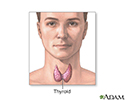Thyroid storm
Thyrotoxic storm; Hyperthyroid storm; Accelerated hyperthyroidism; Thyroid crisis; Thyrotoxicosis - thyroid storm
Thyroid storm is a very rare, but life-threatening condition of the thyroid gland that develops in cases of untreated thyrotoxicosis ( hyperthyroidism , or overactive thyroid).
Hyperthyroidism
Hyperthyroidism is a condition in which the thyroid gland makes too much thyroid hormone. The condition is often called overactive thyroid.

The thyroid gland is located in the neck, just above where your collarbones meet in the middle.
Causes
Thyroid storm occurs due to a major stress such as trauma, heart attack , or infection. In rare cases, thyroid storm can be caused by treatment of hyperthyroidism with radioiodine therapy.
Heart attack
Most heart attacks are caused by a blood clot that blocks one of the coronary arteries. The coronary arteries bring blood and oxygen to the heart. ...

Symptoms
Symptoms are severe and may include any of the following:
- Agitation
- Change in alertness (consciousness)
- Confusion
- Diarrhea
- Increased temperature
-
Pounding heart (
tachycardia
)
Tachycardia
A bounding pulse is a strong throbbing felt over one of the arteries in the body. It is due to a forceful heartbeat.
 ImageRead Article Now Book Mark Article
ImageRead Article Now Book Mark Article -
Restlessness
Restlessness
Agitation is an unpleasant state of extreme arousal. An agitated person may feel stirred up, excited, tense, confused, or irritable.
 ImageRead Article Now Book Mark Article
ImageRead Article Now Book Mark Article - Shaking
-
Sweating
Sweating
Sweating is the release of liquid from the body's sweat glands. This liquid contains salt. This process is also called perspiration. Sweating helps...
 ImageRead Article Now Book Mark Article
ImageRead Article Now Book Mark Article
Exams and Tests
The health care provider may suspect thyrotoxic storm based on:
- A high systolic (top number) blood pressure reading and a low diastolic (bottom number) blood pressure reading may be low
- An increased heart rate
Blood tests are done to check thyroid hormones TSH , free T4 and T3 .
TSH
A TSH test measures the amount of thyroid stimulating hormone (TSH) in your blood. TSH is produced by the pituitary gland. It tells the thyroid gla...

T3
Triiodothyronine (T3) is a thyroid hormone. It plays an important role in the body's control of metabolism (the many processes the body does to func...
Other blood tests are done to check heart and kidney functions and to check for infection.
Treatment
Less severe forms of thyroid storm can be managed well with supportive measures, such as giving oxygen and fluids in case of difficult breathing or dehydration. Treatment may include any of the following:
- Cooling blankets to return the body temperature to normal
- Monitoring any excess fluid in older people with heart or kidney disease
- Medicines to manage agitation
- Vitamins and glucose
The final goal of treatment is to decrease the levels of thyroid hormones in the blood. Sometimes, iodine or other drugs may be given to lower the hormone level in the blood.
Antibiotics are given in case of infection.
Possible Complications
Irregular heart rhythms (arrhythmias) may occur. Heart failure and pulmonary edema can develop rapidly and cause death.
Heart failure
Heart failure is a condition in which the heart is no longer able to pump oxygen-rich blood to the rest of the body efficiently. This causes symptom...

Pulmonary edema
Pulmonary edema is an abnormal buildup of fluid in the lungs. This buildup of fluid leads to shortness of breath.

When to Contact a Medical Professional
This is an emergency condition. Call 911 or another emergency number if you have hyperthyroidism and experience symptoms of thyroid storm.
Prevention
To prevent thyroid storm, hyperthyroidism should be treated.
References
Ferri FF. Thyrotoxic storm. In: Ferri FF, ed. Ferri's Clinical Advisor 2016 . Philadelphia, PA: Elsevier; 2016:1223.e3-1223.e3.
Marino M, Vitti P, Chiovato L. Grave's disease. In: Jameson JL, De Groot LJ, de Krester DM, et al, eds. Endocrinology: Adult and Pediatric . 7th ed. Philadelphia, PA: Elsevier Saunders; 2016:chap 82.
Sharma AN, Levy DL. Thyroid and adrenal disorders. In: Marx JA, Hockberger RS, Walls RM, et al, eds. Rosen's Emergency Medicine . 8th ed. Philadelphia, PA: Elsevier Saunders; 2014:chap 128.
-
Thyroid gland - illustration
The thyroid gland, a part of the endocrine (hormone) system, plays a major role in regulating the body's metabolism.
Thyroid gland
illustration
Review Date: 2/3/2016
Reviewed By: Brent Wisse, MD, Associate Professor of Medicine, Division of Metabolism, Endocrinology & Nutrition, University of Washington School of Medicine, Seattle, WA. Also reviewed by David Zieve, MD, MHA, Isla Ogilvie, PhD, and the A.D.A.M. Editorial team.

